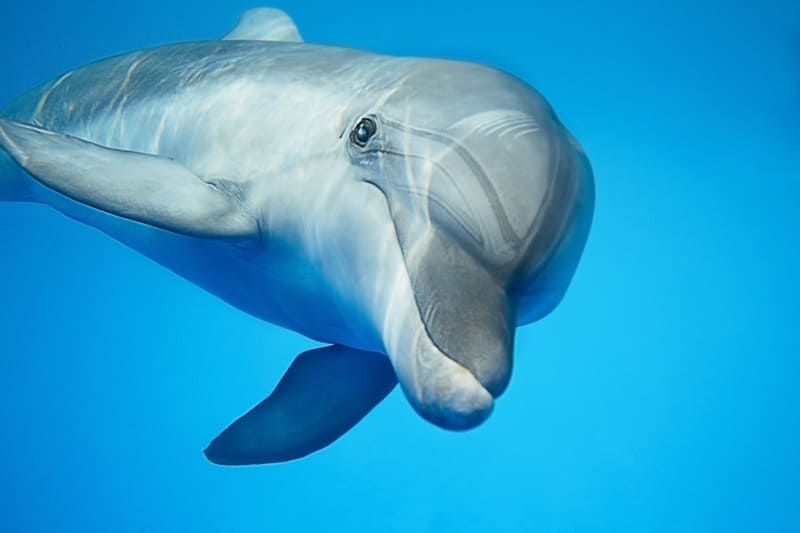Fins Up for National Dolphin Day!
Dolphins, They’re Just Like Us!
Wednesday, April 14th is National Dolphin Day and is a way to pay tribute to these friendly mammals of the sea. The lives and personalities of dolphins are really quite impressive. They are generally happy and social creatures that like to surround themselves with others– much like humans. They may even look like they are smiling as they swim along.
There are more than 40 species of dolphins, ranging in size from four to 30 feet long. The species we may be most familiar with though, are the bottlenose dolphins that enjoy the shallow waters just off the shore of New Jersey beaches. These social, energetic, and intelligent creatures are truly an asset to us on-shore and to ocean life. But, how can we help make sure they survive and thrive? Here are some ways we can honor and protect them this National Dolphin Day.

A Day in the Life
The day in the life of a dolphin is one thing for certain: active. On any given day, they will move around the ocean mingling with several different groups of dolphins called pods. Their streamlined bodies and flippers allow them to move through the water quickly and efficiently. They are also finding food to eat and doing their best to avoid any hazards. One of the most interesting things about dolphins is how they actually navigate in the water. All dolphins are equipped with built-in sonar. The high-pitched noises or clicks dolphins are known to make, bounce off of objects or other animals and create vibrations so the dolphin is able to find or avoid something with ease. Pretty cool!
How Can We Protect Them?
Reef-Safe Sunscreen
Chemicals that are often in sunscreens can wash off our skin and disperse in tiny microscopic particles, often referred to as nanos. These particles can be harmful in a few different ways. Common ingredients in sunscreen, like titanium dioxide, can slide off of our bodies when we enter the ocean. The microparticles then may be exposed to ultraviolet light where a chemical reaction turns it into hydrogen peroxide. When levels of hydrogen peroxide accumulate, it can hinder the growth of phytoplankton, something many big fish and mammals rely on for food.
When sunscreen is not biodegradable, levels of harmful chemicals can build up in the water and thus build up in the tissues of marine animals, like dolphins. Once these chemicals find their way into the bodies of animals, they act as hormone disrupters and can affect everything from reproduction to immune system function.
When making a decision on which sunscreen to purchase, consider finding one that contains “non-nano” ingredients. This means that the product when washed away from the skin will not break down into harmful nanoparticles. Martindale’s is proud to carry Derma•E mineral sunscreen and Badger natural mineral sunscreen, both of which are made with non-nano ingredients.
Dolphin-Safe Tuna
Every year at least 300,000 deaths of larger sea animals like whales and dolphins occur. As they are swimming about, large fishing nets or other large debris floating in the ocean entangle them. Because dolphins are in fact mammals, they must return to the surface for air roughly every 5 minutes. However, when they become entangled, this is impossible and they suffer, and many die.
Fortunately, in compliance with the Dolphin Protection Consumer Information Act, companies are doing something about it. Certain types of fishing equipment have been banned altogether and tighter guidelines have been established on allowable fishing techniques. Often, in the past, when commercial fisheries were casting nets to catch tuna, they would inadvertently capture many dolphins within those nets too. Something had to be done to eliminate this threat, and thus certain types of nets and netting practices were eliminated.
Also, with the passing of this act, was the consideration of the consumer’s right to accurate information on how their food is sourced. Tuna that is fished in an ethical manner can be labeled as such. Companies that falsely label their product dolphin-safe will pay a hefty price. Make sure to look for “safe” labels when purchasing your seafood. All of the tuna found on the shelf at Martindale’s is dolphin-safe. Shop brands you can trust like Wild Planet, Natural Sea, Cadia, Sustainable Seas, and Safe Catch Elite.
Celebrating National Dolphin Day
In addition to swapping out your sunscreen products and being mindful of where your tuna comes from, there are other ways to help do your part. Make it a goal this National Dolphin Day to do one or a few of these action items:
- Educate yourself and your family about dolphins
- Donate to a fund dedicated to their protection
- Donate your time to water or beach conservation projects
- Be mindful of litter and proper trash disposal methods. Make sure you are putting items in their proper receptacles when finished. If you are discarding an old net or a similar material or you are recycling soda can rings, make sure to cut them so they can’t make their way around the body or nose of a dolphin.
[print-me]
